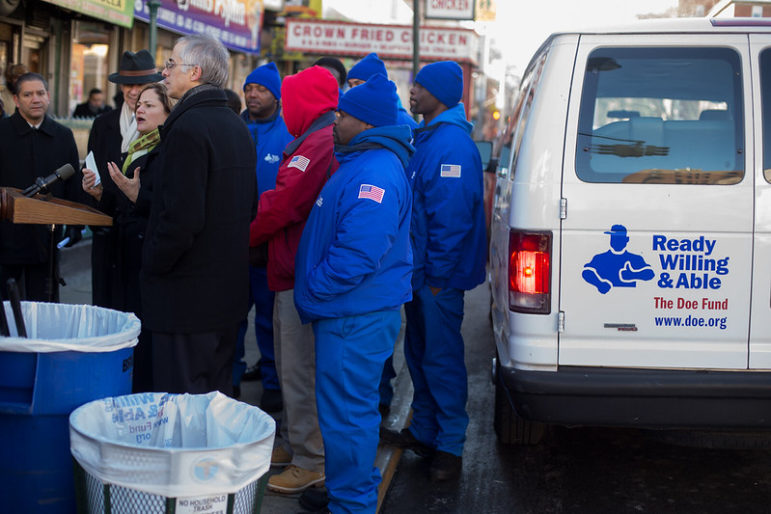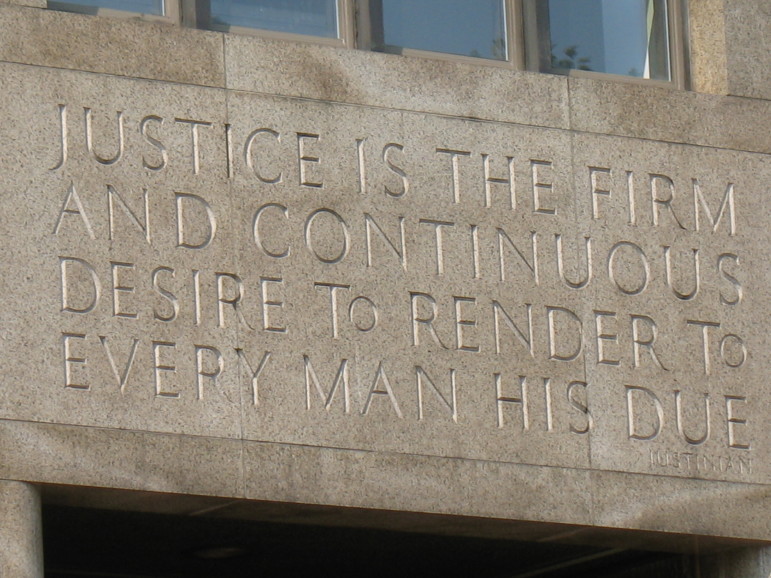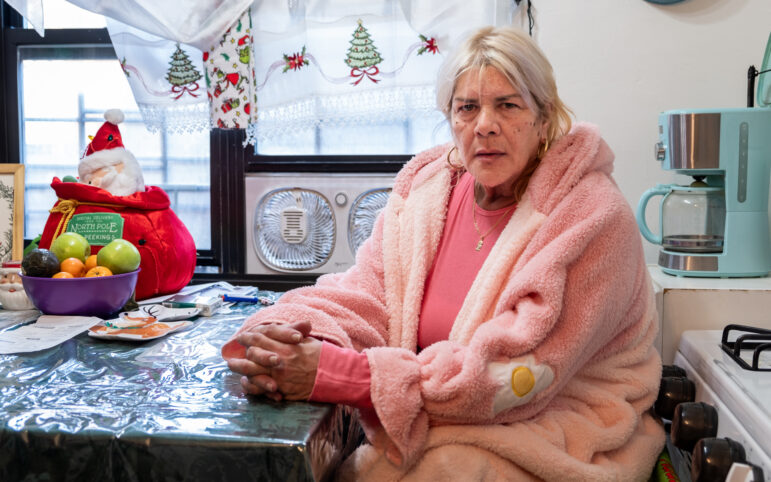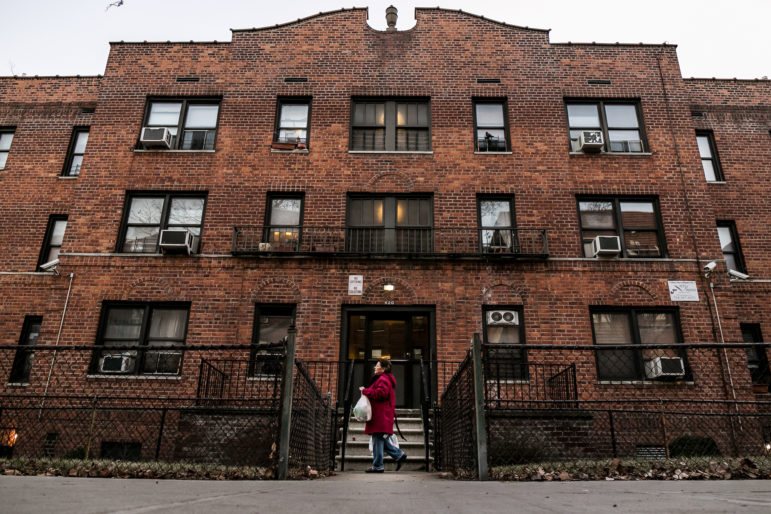Housing Works and the Doe Fund are breaking into the cannabis industry and pioneering new terrain for nonprofit organizations post-pot prohibition. But the two organizations have different business models as well as divergent approaches to substance use when it comes to their own clients.

William Alatriste/New York City Council
Doe Fund workers and elected officials at a press conference in 2015. The nonprofit is known for its street cleaning employment program dubbed “Ready, Willing & Able.”One homeless services provider works with people who use drugs, wherever they fall on the spectrum of recovery and continued consumption, without penalty. The other takes a zero tolerance approach to substance use, including marijuana, and suspends clients from its signature work program following a positive urine test.
Both are breaking into the cannabis industry, pioneering new terrain for nonprofit organizations post-pot prohibition—but with different business models and approaches to substance use.
Last month, New York State’s Cannabis Control Board and Office of Cannabis Management (OCM) approved Housing Works, the group with the nuanced perspective on substance use, and the Doe Fund, which adheres to the abstinence approach, for two of New York State’s first-ever licenses to sell legal marijuana. A third organization, the Queens-based anti-violence group LIFE Camp, was also approved from a pool of 20 nonprofits that applied for Conditional Adult-Use Retail Dispensary (CAURD) licenses.
Housing Works and the Doe Fund each serve people experiencing homelessness and are well known for their “social enterprise” businesses: men enrolled in the Doe Fund’s “Ready Willing and Able” program clean the streets of New York City’s business improvement districts in exchange for shelter and a modest wage that covers living expenses, like rent; Housing Works operates a dozen thrift shops and a SoHo bookstore.
All told, New York issued 36 licenses statewide, under the 2021 law that legalized adult-use cannabis. Qualifying nonprofits had to demonstrate a history of intentionally serving and creating job opportunities for current or formerly incarcerated individuals—part of the state’s mission to boost businesses owned and operated by New Yorkers, particularly people of color, targeted during the war on drugs.
OCM spokesperson Aaron Ghitelman said the agency “is proud that New York is the first state in the nation to license community-based non-profit organizations to operate adult-use retail dispensaries, enabling them to use profits from cannabis sales to fund their other vital work.”
Doe Fund and Housing Works each say the ability to sell cannabis promises a new revenue stream to fund services for the organizations’ clients in homeless shelters, work programs and supportive housing. But with nonprofits locked out of a state “equity” fund to help the first licensees get their businesses off the ground, the two organizations are taking different approaches.
The Doe Fund has partnered with the newly created firm Harbour to sign a lease on a downtown Manhattan storefront. Harbour was founded by Arana Hankin-Biggers, a former official at Empire State Development and senior vice president at WeWork, and Paul Yau, a managing partner at the consulting firm Tribeca Black, according to their LinkedIn profiles.
Harbour will be in charge of hiring staff and will give half of the profits from the soon-to-open Doe Store dispensary to the Doe Fund, according to Harbour’s spokesperson Stuart Zakim. Zakim declined to give the monthly rent or share the specific location of the shop.
The familiar blue-uniformed participants of the Doe Fund’s “Ready, Willing and Able” work program will not be involved in the dispensary or the cannabis supply chain at all, said Doe Fund spokesperson Elizabeth Lion.
In fact, they will continue to submit to mandatory drug tests and can be suspended for using marijuana, Lion said.
As a condition of the work program, the men agree to forgo drugs and alcohol for the duration of their tenure, which lasts nine to 12 months. The Doe Fund will continue to test its work program participants for cannabis, even though adult use is now legal, Lion said. Following a substance use suspension, the participants are referred for treatment and readmitted to Ready, Willing and Able after completing the treatment protocol, she added.
“Our goal is to help our participants recover, not penalize them,” Lion said
She emphasized that participation is voluntary for individuals who seek a sober environment, often because they are in recovery from substance use. The program has served around 30,000 people, she said.
“For three decades, The Doe Fund has lived on the cutting edge of innovation, relentlessly pioneering ways to restore racial, economic and criminal justice to communities disproportionately impacted by systemic failures and inequity,” Lion said. “Upon their release—without successful reentry programs—they face the same marginalization from the mainstream, the same lack of economic opportunity that led them to resort to crime in the first place.”
But one Doe Fund participant who spoke to City Limits on condition of anonymity said he and his colleagues, who stay in a Doe Fund shelter, found the continued marijuana tests hypocritical.
“They’re telling us not to do it and testing us, but they’re selling it,” he said. “Some of us were just talking about that.”
The cognitive dissonance of a notably abstinence-only organization set to profit off cannabis sales has struck many homeless and civil rights advocates, as well.
“Any organization that is allowed to have a marijuana distribution license should be operating from a harm-reduction perspective, including in their own organization,” said VOCAL-NY Organizing Director Jawanza Williams, who was deeply involved in the effort to legalize marijuana in a way that benefits the communities of color targeted by war on drugs enforcement.
The harm reduction philosophy centers strategies for safe substance use while working with individuals to meet their goals, from sobriety to managed consumption, without imposing a hard-line zero tolerance policy.
But Terrence Coffie, a former Doe Fund participant who spent time in prison before earning his social work degree and becoming an adjunct professor at New York University, downplayed the zero tolerance policy and said creating a “pathway to employment” for formerly incarcerated individuals is the organization’s key function.
Coffie now leads the Social Justice Network, which advocates for people impacted by decades of hardline anti-drug policies to benefit from New York’s nascent legal cannabis industry.
“My hope is they continue their employment mission [to] create a more just and equitable system in regards to this population,” he said. “Because, unfortunately, traditional employers continue to practice discrimination.”
Charles King, the CEO of Housing Works, meanwhile, said he found Doe Fund’s cannabis license “highly ironic.”
“I’m aware they have a very divergent philosophy on substance use, including use of cannabis,” King said. “Maybe they could see a benefit in their consumers becoming customers.”
Housing Works, for its part, is “happy to work with people who continue to use drugs, whatever their commitment to continued use or recovery,” King said.
The organization runs 11 supportive housing sites and two transitional homeless shelters, while renting 297 apartments from private landlords for use as “scattered-site” supportive housing. They are taking a different approach to cannabis sales, going it alone with a private partner, King said.
“We’re a fairly large organization, so it’s going to be easy for us to capitalize,” he said.
King said Housing Works is set to sign a lease on a retail space near Broadway and Astor Place and will hopefully open as a “pop-up” this month. He said he did not know the monthly rent because the organization has not yet signed a lease. In addition to space, HousingWorks and the Harbour-Doe Fund venture will have to pay staff and purchase product, which can vary from $1,000 per pound of unprocessed “biomass” to $3,000 for smokable flower.

City Limits
King said the store will likely hire 12 to 20 employees to staff a dozen checkout stations, work the pick-up counter and handle inventory. Some of the staffers may be Housing Works clients, he said. The organization already hires clients to work at its thrift stores.
“We are actively recruiting people who have a history of justice involvement, and if any of our consumers come forward with that history and want to apply, we generally give consumers and staff priority for positions we offer,” he said.
Housing Works will also submit a proposal to the state’s cannabis board for a training program that allows people who have been arrested for cannabis possession or sale to get the legal business experience required to qualify for future CAURD licenses, King said.
The nonprofits will soon face stiff competition. In the wake of New York’s cannabis legalization, as regulators took a calculated approach to licensing, a medley of marijuana merchants have cropped up across the five boroughs—particularly in Manhattan. Getting them to give up a lucrative business without replicating war on drugs-style crackdowns will be a challenge, OCM Executive Director Chris Alexander acknowledged during an interview on WBAI’s City Watch in October.
“Every state that has ended prohibition has had some period of ramp up with illicit market activity,” Alexander said. “We also have to educate law enforcement and municipal governments about their role in continued enforcement.”
Unlike the first set of individual licensees, nonprofits will not have access to the $200 million pool of funding pledged to help stand up the business (though a recent report by New York Cannabis Insider found that the state may have misjudged the pair of private investors tasked with raising the bulk of that funding).
Still, said Jesse Campoamor, a cannabis industry consultant and former official under ex-Gov. Andrew Cuomo, the state has an interest in ensuring the legal vendors, including the nonprofits, achieve success in the new venture. They may revisit some of the rules restricting access to the fund.
“What’s become clear is that there have been some unintended consequences for nonprofits in the space and it’s an issue the state will have to examine, hopefully sooner rather than later,” he said.









One thought on “Two Homeless Service Providers Break Into Legal Weed Industry, with Different Approaches”
I’m thankful for the valuable insights you’ve shared.